English Dharma Q&A; A Conversation with Young People from Vietnam (May 26th, 2024)
Hello! Daybreak has arrived at Dubuk Jungto Retreat Center. Today, Ven. Pomnyun Sunim will spend time with VCIL Travel School (VTS) activists from DaNang, Vietnam.
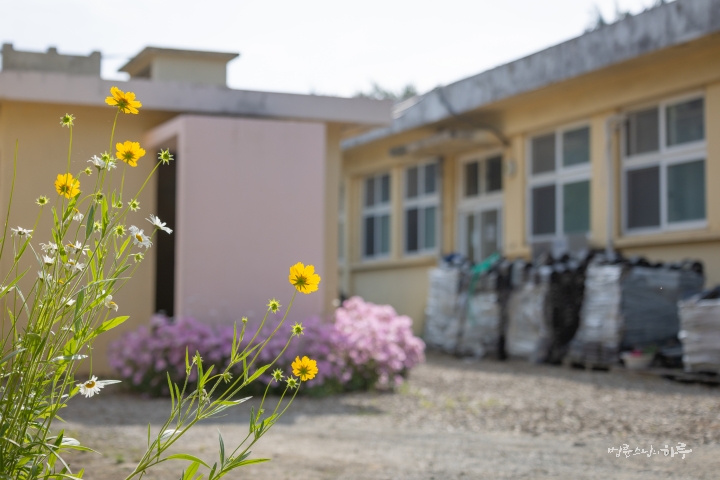
After his daily morning practice and meditation, Sunim began his day with an English Dharma Q&A session for a global audience at 8 a.m. The emcee warmly greeted about 200 viewers tuning in from around the world.
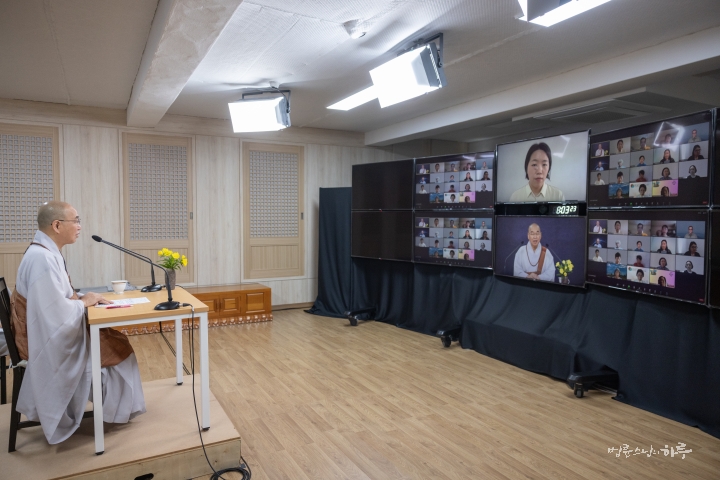
“Hello everyone! It’s good to have you join us.”
Before the conversation began, a video was played showcasing Sunim’s trip in early May to Washington, D.C., where he met with government officials, members of the legislative branch, and thinktank representatives to advocate for peace on the Korean Peninsula.
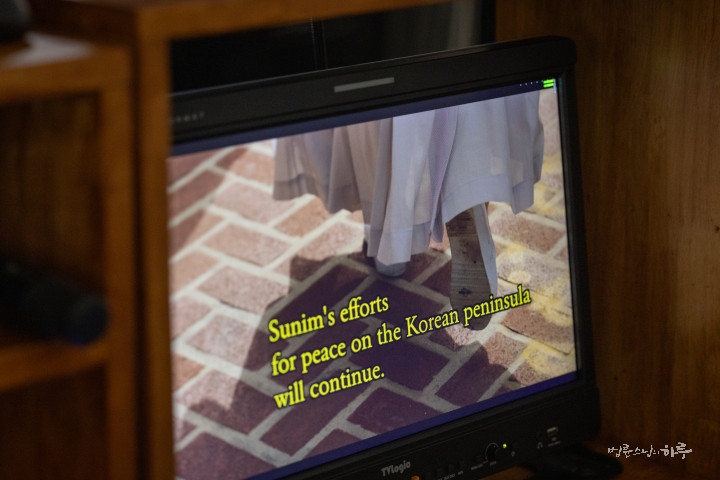
Two people posed questions, with one seeking Sunim’s advice on managing unpleasant feelings for which he didn’t know the reasons.
How can I control my mind when I have unpleasant feelings?
“How can I live my life with confidence if I keep doubting myself? I have been told that the Buddha said that there is no right or wrong way to live in this world. I understand that it is important to be happy with who I am. Whenever I seek and expect more from myself than I have done, I make myself focus on the breath. From time to time I lose confidence in myself or in my life, then I strongly question whether there is something wrong with my life. But I do not know the exact reason. When I feel unhappy or uncomfortable, is it just a feeling, like being happy or calm? I have learned that being gloomy or unhappy is a kind of habit. Do you think I need to remove or fix these feelings for my practice? Or is it okay to question myself whenever I have unpleasant feelings or thoughts about my life?”
“Unpleasant feelings are negative mental phenomena, so it’s best if we can avoid them altogether. However, we tend to experience them more often than pleasant ones. The Buddha explored why these unpleasant feelings arise and offered guidance on reducing their occurrence. For instance, feeling inferior doesn’t mean that someone is inherently lesser; it comes from a desire to outshine others. When this feeling arises, it leads to discomfort.
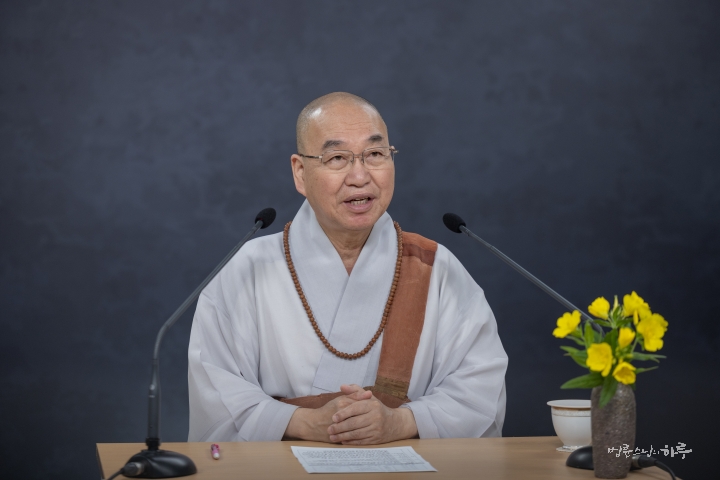
“For example, let’s say that my ability to perform a certain task is at a level of 100. I want to be at a level of 200, however my actual ability remains at 100. This discrepancy makes me feel inadequate and inferior. So will my problem be solved if I increase my ability to 200? This might seem like a solution, but it’s very difficult to achieve. It requires tremendous effort and, sometimes, it’s impossible despite my effort. For now, let’’s assume that I’ve managed to increase my ability to 200. I might feel satisfied—but only briefly. Soon, I would notice people with abilities of 300 and start desiring to reach that level. Thus, my satisfaction would be short-lived, and I would again feel inadequate and inferior.
“So how can I overcome this sense of inferiority? If my ability is at a level of 100, I should find satisfaction in that. Then I won’t feel inferior. If I want to perform better, I need to apply myself. There’s a big difference between thinking ‘100 is okay, but I want to improve’ and believing ‘I should have the ability of 200.’ Having an ability level of 100 is already a significant achievement. Everyone in the world is perfect as they are; they are not inadequate. It’s perfectly fine to live as you are. If you want to improve your abilities, you can put in the necessary effort. If you adopt the perspective that it’s okay to live as you are or to strive for self-improvement, you won’t suffer. Being satisfied with an ability level of 100 doesn’t mean you stop trying. It means you use that as a foundation and choose to improve if you wish to do so.
“Let’s take an analogy from nature: rabbits are perfect as rabbits, squirrels are perfect as squirrels, and cats are perfect as cats. No animal compares itself with another and thinks, ‘I’m not fast enough,’ or ‘I’m not ferocious enough.’ In nature, each being is perfect just as they are. A bit more exertion based on this foundation can always happen in nature as well. Therefore, if you feel inadequate, you must realize that this feeling is not rooted in truth. Each of you is complete just as you are. Your life is complete just as it is and in the eyes of others. If you want to achieve something, you can certainly strive for it. However, failing to accomplish your goal doesn’t mean that you’re inadequate. This is because you’re complete just as you are.”
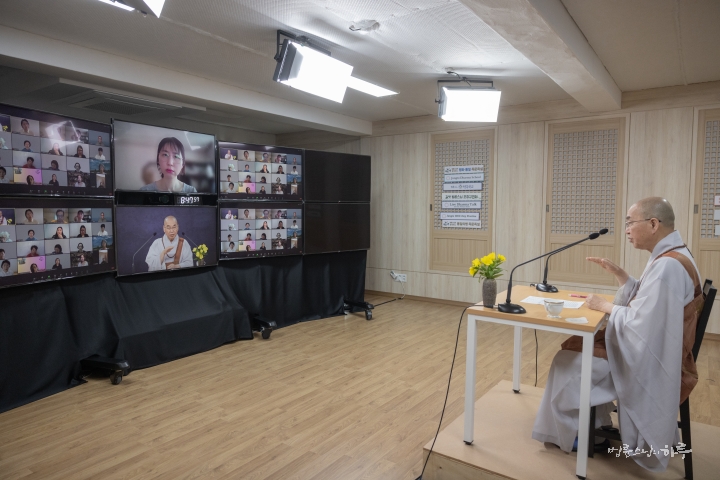
“I see your general point. I just want to make sure that I need to breathe and realize that I am complete as I am whenever I feel unhappy or uncomfortable.”
“The easiest way to manage an unpleasant feeling is to recognize it, thinking, ‘My mind is engulfed by a negative feeling right now.’ When you acknowledge a negative feeling, it often dissipates quickly. This is the first step of practice: awareness. You don’t need to investigate its cause; you just need to be aware of your present feeling.
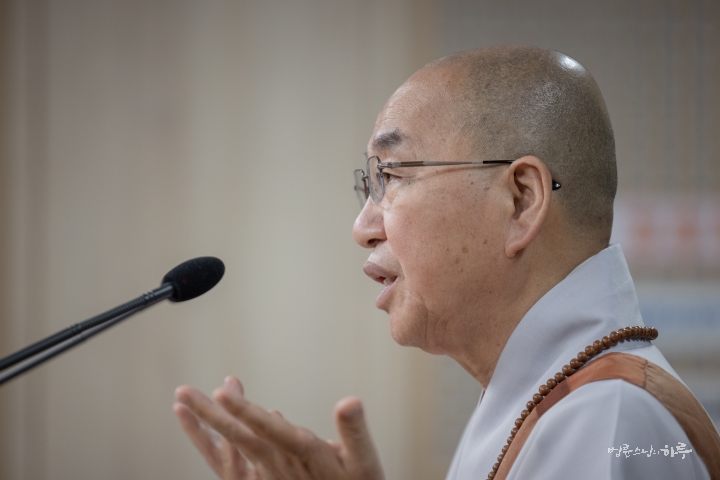
“The second step is to investigate: ‘Why does this unpleasant feeling arise?’ For instance, ask yourself: ‘Why do I feel uncomfortable while having a conversation with that person?’ Often, it’s because things are not unfolding as you desire. However, it’s important to recognize that others’ words or behaviors cannot always meet your expectations. Sometimes they will, but knowing that they won’t always do so can help you to avoid feeling unpleasant when they don’t. If you strongly desire or are attached to them acting a certain way, you’ll feel unpleasant when they don’t.
“Each person has different thoughts, words, and actions. Others speak and act in their own way, not according to what we want. The problem doesn’t lie with them. The attachment to having things go our way is what causes unpleasant feelings. Therefore, when we let go of this attachment, the unpleasant feelings disappear. This applies not only to interactions with people but also to our relationship with nature and with ourselves.”
“Thank you. I see.”
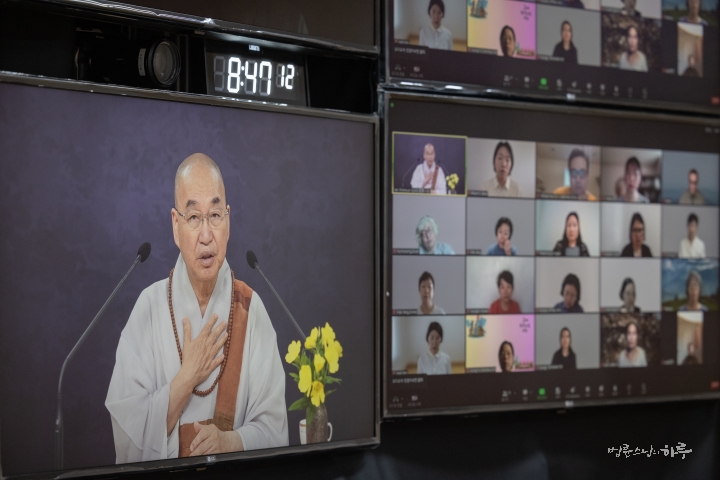
It was almost 9 a.m. when the Dharma Q&A ended. After concluding the live stream with a promise for the next time, Sunim held balugongyang (Korean ceremonial monastic meal) with young people from Vietnam at 9:30 a.m.
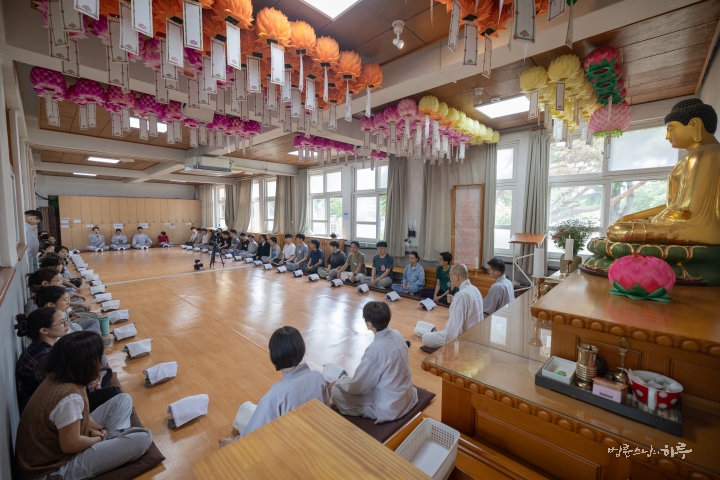
Since yesterday, some members of Jungto Society’s Youth Division have been staying at Dubuk Jungto Retreat Center, working on the farm with the Vietnamese youths. About 50 Vietnamese and Jungto Society youths joined the meal.
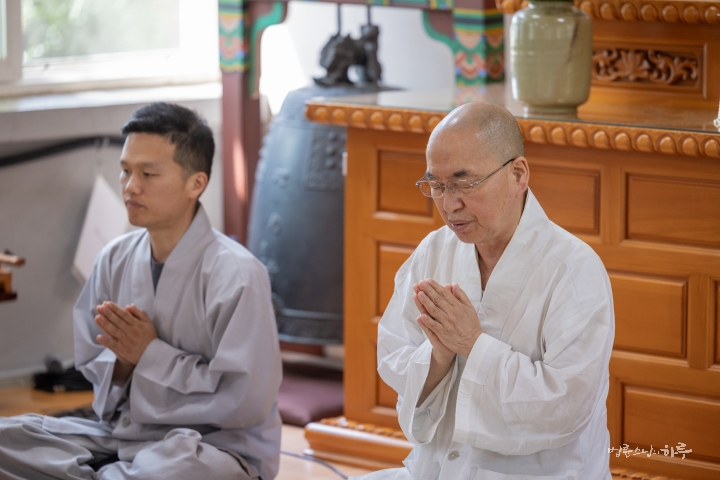
“The Buddha was born in Kapilavastu, attained enlightenment in Magadha, preached the Dharma in Varanasi, and entered parinirvana in Kushinagar.”
While chanting, we arranged our four bowls on the placemat and ate quietly. Afterward, we cleaned the bowls with a piece of kimchi and ate it.
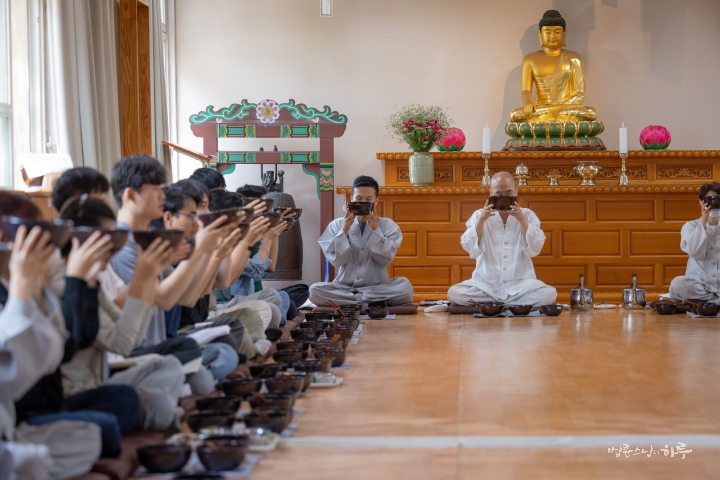
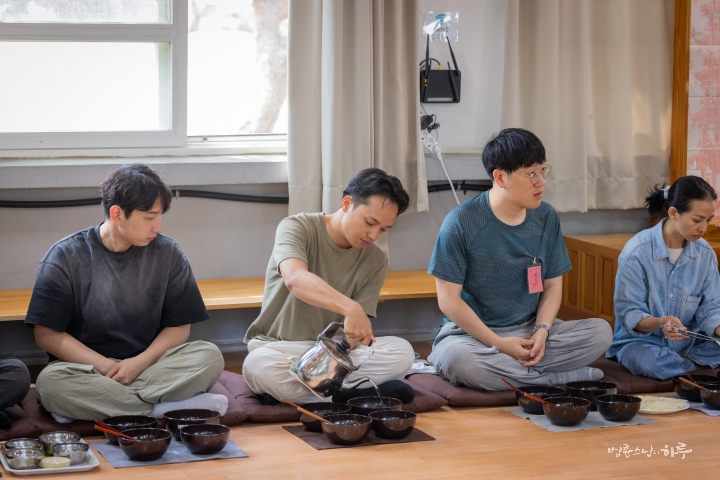
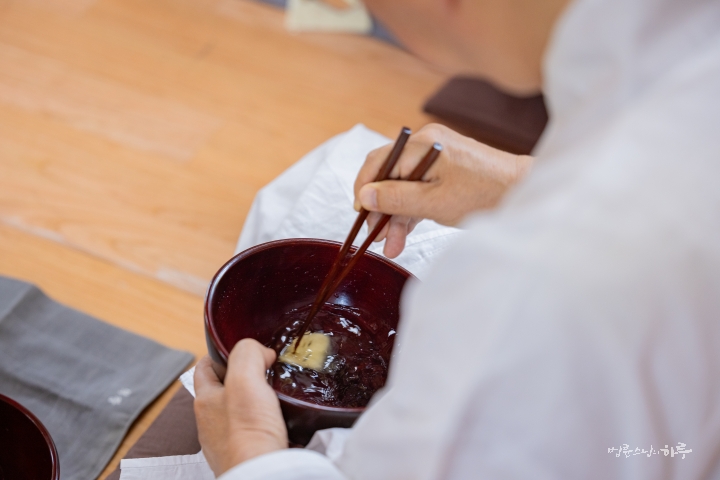
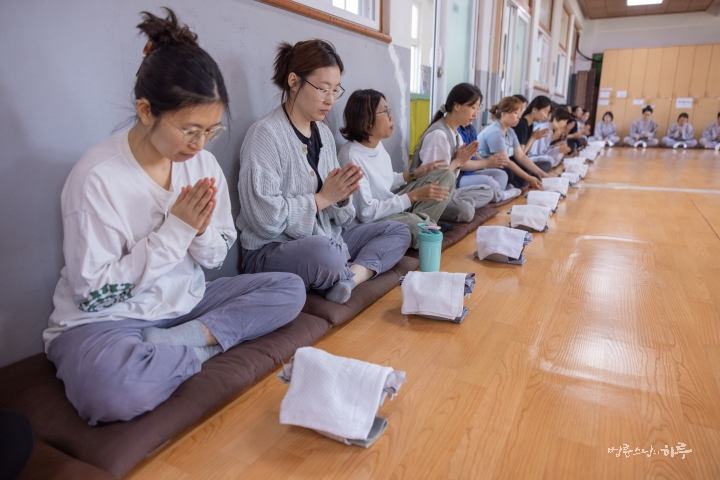
The Vietnamese youths seemed quite adept at the meal ritual, perhaps because they had been practicing it at the retreat center for the past five days.
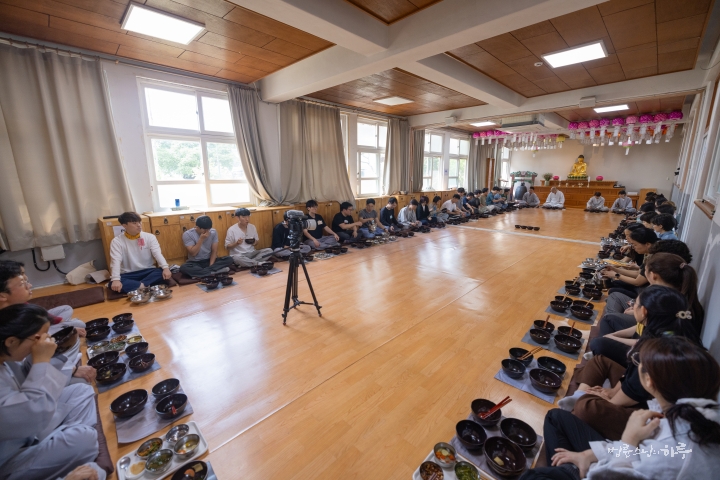
After the meal, Sunim extended words of welcome to the Vietnamese youths and to members of Jungto Society’s Youth Division.
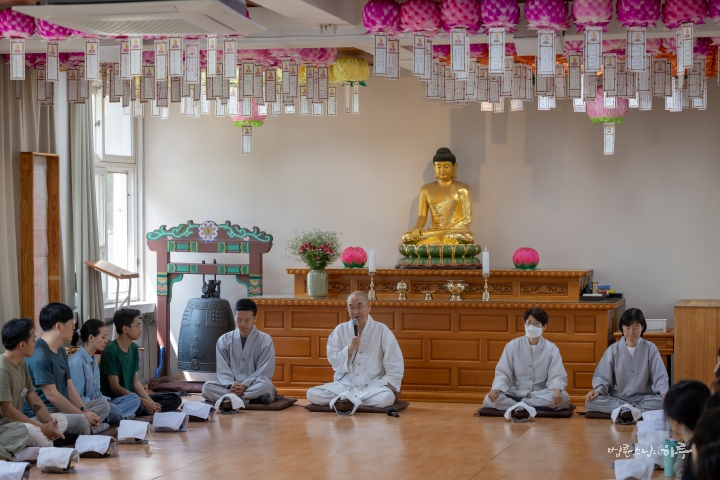
“I am happy to have both young people from Vietnam and members of Jungto Society’s Youth Division here. Welcome, everyone. It’s a pleasure to meet you all.”
Following that, Sunim explained the significance of balugongyang;
Four principles embedded in balugoingyang
“There are four principles embedded in balugongyang. Firstly, simplicity in eating. Secondly, ensuring no food is wasted. Thirdly, offering an equal share to everyone. Fourthly, maintaining cleanliness while eating. Each of us is responsible for our own bowls, ensuring that there is no risk of contamination.
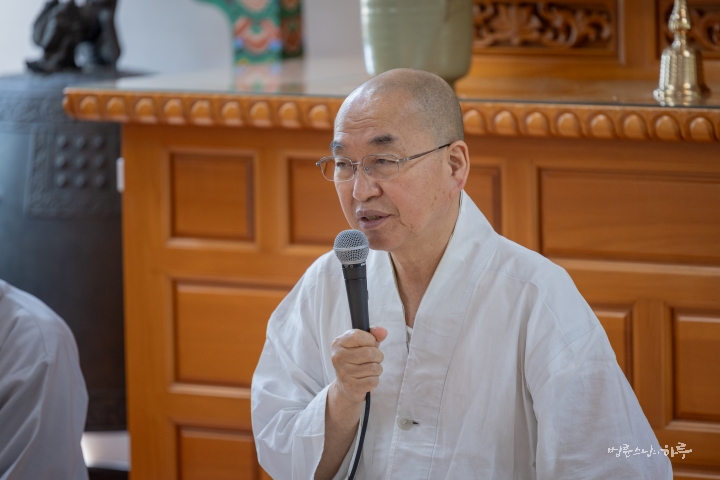
“The sutra recited during balugongyang is called Sosimgyeong. It focuses on expressing gratitude toward those who prepared the food, prompting self-reflection on whether we have been worthy of receiving it, and fostering a desire to share it with others in consideration of the hungry. Practitioners view eating as a means to maintain a healthy body in order to attain enlightenment, rather than merely to feel full or to enjoy the taste. Additionally, it includes a commitment to diligently practice in remembrance of the Buddha and fellow practitioners.
“Not all traditions can be carried on, but balugongyang is preserved by Jungto Society because it exemplifies the attitude that practitioners should embody. Especially in this era of climate crisis, it is crucial to reduce consumption and live frugally. By practicing balugongyang, even for just one meal in the morning, we can reflect on and adjust our approach to life.
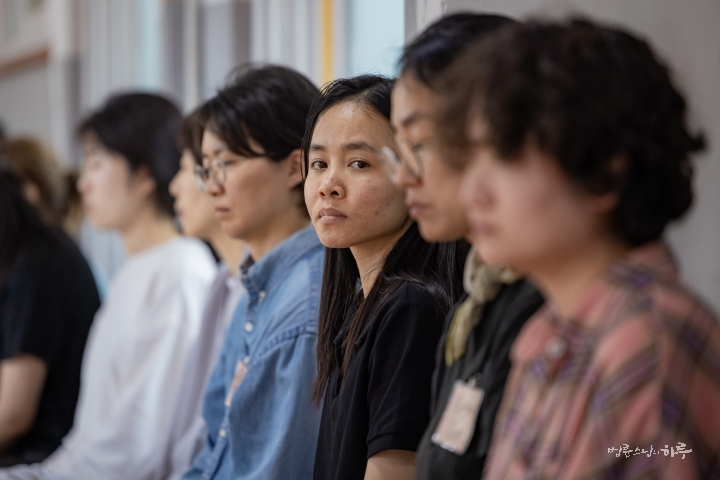
Time to remember the sense of community
“Those living in the sangha should gather together at least for balugongyang and share their plans for the day with one another. Additionally, if anyone has fallen short in their conduct or broken any precepts during the previous day, they should confess these shortcomings to the sangha, saying, ‘I had these shortcomings,’ to prevent any misunderstandings among members.
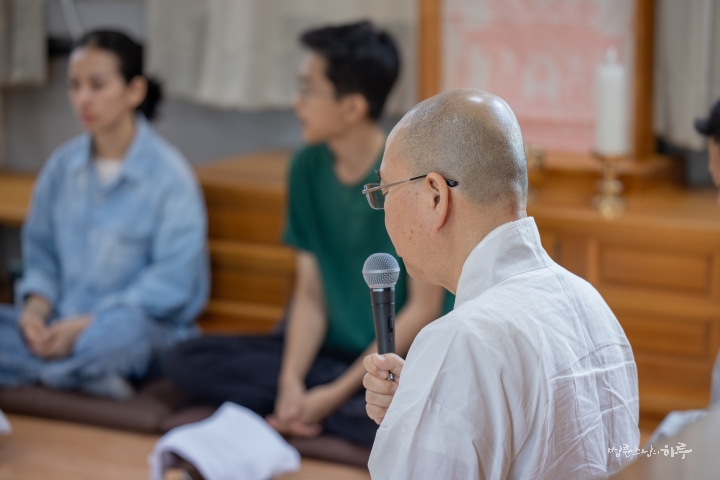
“In modern society, and even within the sangha, people increasingly spend more time alone. If we’re not careful, this can weaken the sense of community, even while living together. Especially in such times, balugongyang should serve as a reminder that we are living together. I hope that you, too, do not forget this spirit when participating in balugongyang.”
After balugongyang and cleaning up, Sunim began a conversation with the young people at 11:30 a.m.
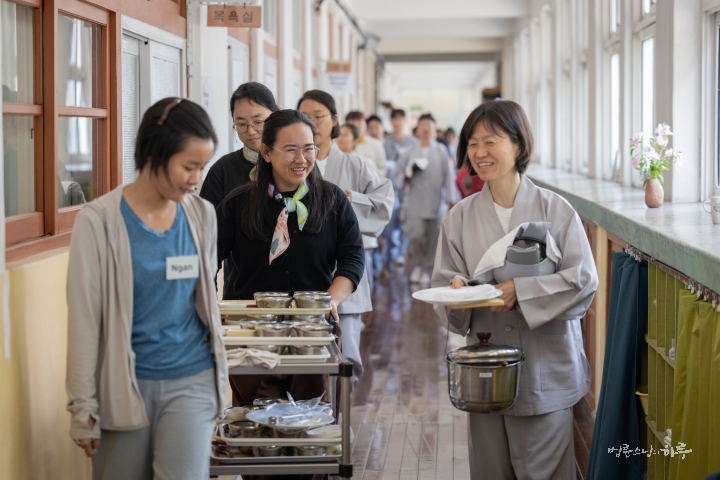
The youth group Vietnamese Community of Independent Learners (VCIL) from Vietnam consists of young people in their 20s who have been engaged in developing and implementing alternative education programs. They also work with those who advocate for eco-friendly movements and sustainable development. It was decided that they would visit Jungto Society each spring and fall, starting this year, in consideration of their keen interest in Jungto Society’s philosophy and practices.
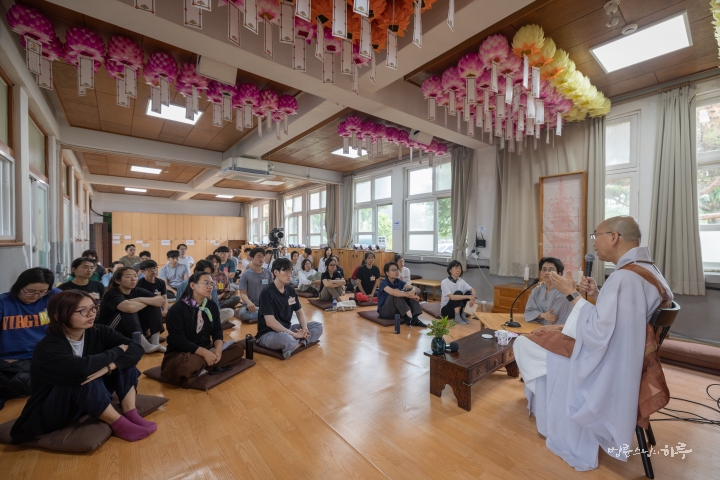
Before starting the conversation, Sunim briefly introduced the activities at Dubuk Jungto Retreat Center.
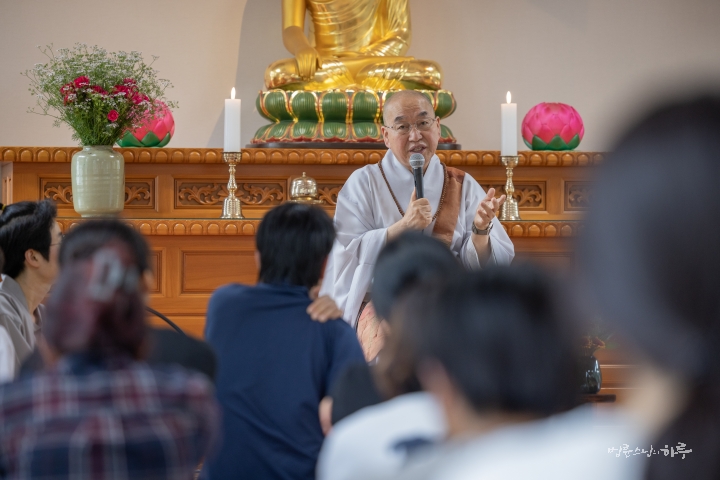
“This school is the elementary school that I attended as a child. It closed down because there were not enough students, but we leased it 20 years ago to use as a retreat center. Jungto Society chose this location partly to explore alternatives to the decline of rural communities, and partly to embody a self-sufficient lifestyle and produce safe food. In Korea, many usable items are often discarded. We facilitate the reuse of such items here. This place is also used to store items that will be sent to impoverished countries. Many elderly people live in this area, so initially we focused on welfare projects for seniors, such as cleaning, preparing traditional side dishes, and organizing trips. During the COVID-19 pandemic, I came here and began working on various projects.”
Next, the Vietnamese youths asked Sunim various questions. The first question was posed by Vu, the leader of VCIL. It was about the side effects of Korea’s rapid economic development.
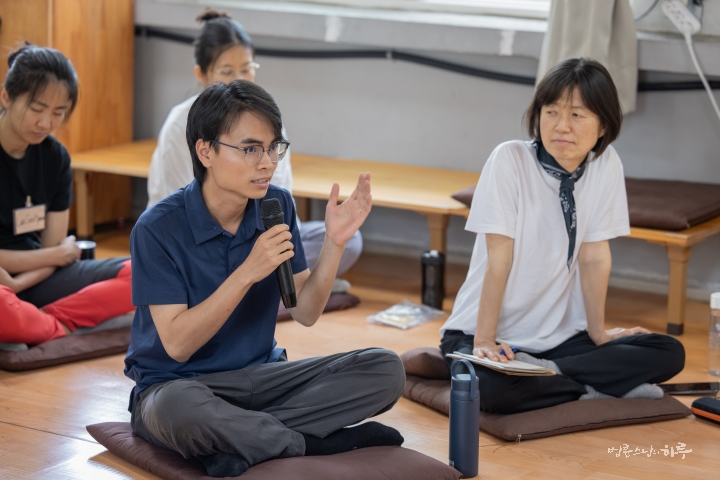
What should Vietnam do to avoid the side effects of economic development experienced by Korea?
“After I came to Korea, I learned that behind the economic growth, which Vietnam aims to emulate, there are shadowy sides such as an aging population, a low birth rate, and a high rate of suicides. How can such side effects be avoided in advance?”
“It took more than 200 years for Western countries to reach their current state. However, Korea achieved it in just 50 years, especially by directly emulating the advanced development model of the United States. However, because Korea rapidly adopted foreign methodologies, it also experienced many side effects. Many Koreans were eager to learn from the United States, but hardly any studied the side effects or sought alternatives. Most Koreans who studied in the United States pursued their intellectual and economic interests, so there was little interest in understanding the hidden aspects of economic development.
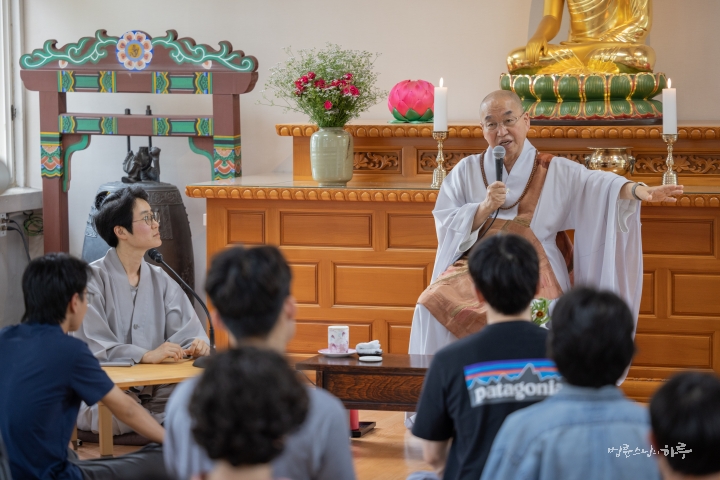
“Although many Vietnamese students study in Korea now, there are probably few individuals researching the shadowy side behind Korea’s economic development, with a view to preventing Vietnam from experiencing similar issues. As a result, I believe that in 20 years, Vietnam will face the same side effects with which Korea is currently grappling. Twenty years ago, Korea was already aware of Japan’s problems, including a long-term recession, serious aging population issues, and many young people isolating themselves from society. However, 20 years later, Korea is facing even worse problems.
“You’ve lived in this rural area for a week now. At first glance, you might think, ‘Wow, even the countryside has well-made roads,’ or ‘Farming is completely mechanized here.’ However, on closer inspection, you’ll notice that there are hardly any people living in the countryside. Those farming, raising cattle, or working in factories are mostly foreign workers. While we may say that Korea is a developed country, with large farms and factories and so forth, what’s the use of all this development if there’s no one living here?
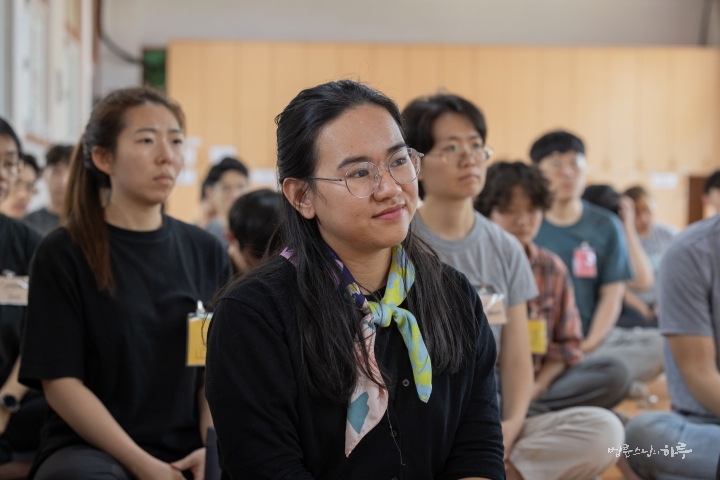
“The only people living in the countryside are the elderly. Their children, living in the cities, can barely visit once or twice a year. Some children don’t even keep in touch at all. What’s the use of all this development for the elderly? Ultimately, when they become immobile due to old age, they are sent to nursing homes and die alone. Moreover, cases of young Koreans not marrying, living off their parents, or staying in their rooms all day long are increasing. The birth rate has dropped to 0.7, and the suicide rate is the highest in the world. Is this really living well?
“When you come to Korea, it’s easy to see only the glamorous side. However, I believe it’s very important to investigate the type of society you want to shape Vietnam into by observing the shadowy side of economic development. I have doubts about whether the direction in which not only Korea and Vietnam but also human civilization as a whole is heading is truly desirable. Therefore, I am currently working on creating a sustainable development model in Bhutan that humanity can consider as a model for the future.
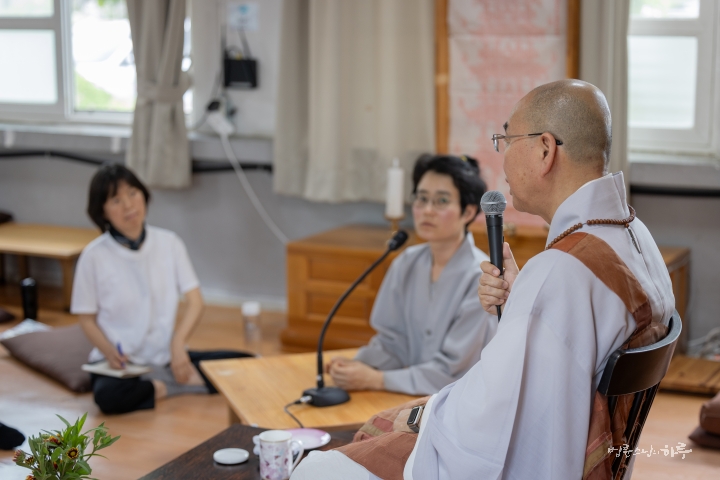
“This is the reason I decided to meet with you. I heard that 80,000 Vietnamese students are studying in Korea. I haven’t had the chance to meet them yet. However, since you are also interested in learning about Korea’s economic development, you now have this opportunity to converse with me.”
There were also questions about how Jungto Society has been maintained and how Sunim has operated it. Lam was curious about how Sunim has been able to work consistently for the past 30 years.
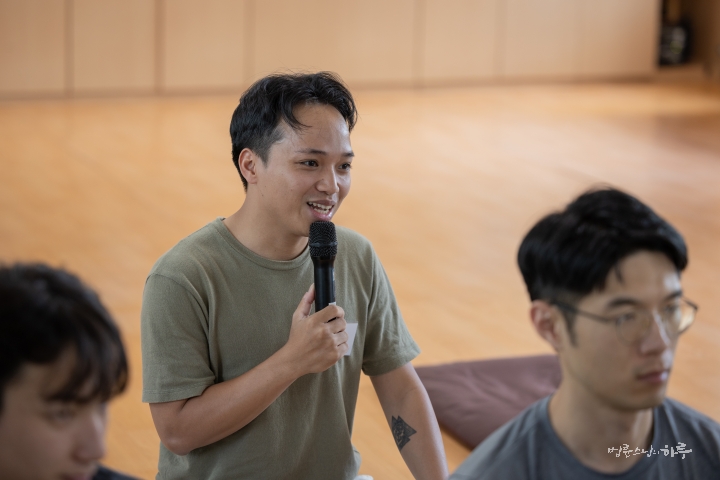
“I’m curious to know how you’ve consistently led Jungto Society for the past 30 years.”
“I think that I’ve been able to work for this long because I don’t feel much stress. I am a practitioner who cultivates my mind, after all. No one can continue to work for long if they feel stressed or tired.”
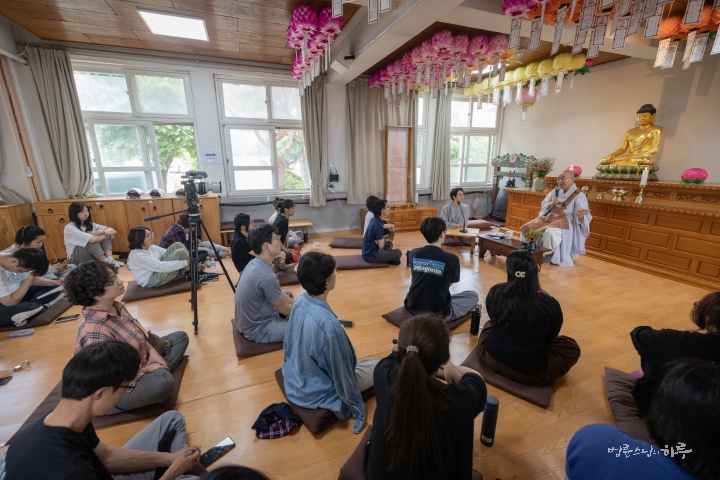
The questions continued. Kunzan from Ladakh asked how to work without stress.
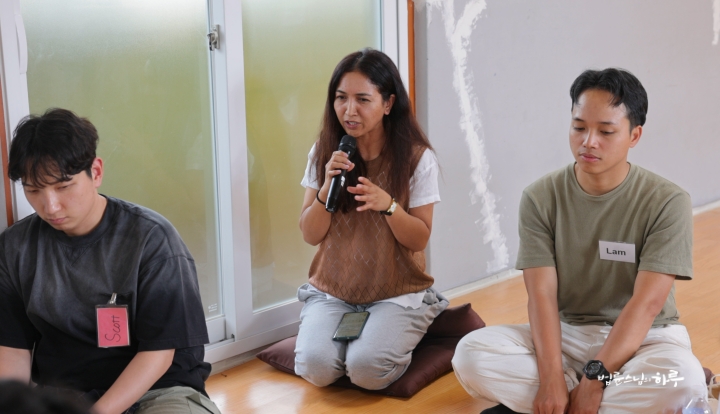
How can I overcome stress?
“You mentioned that you’ve been able to continue your work for a long time because you don’t get stressed. I’ve been farming, writing, and striving to preserve the knowledge of indigenous people for six years. However, sometimes I lose inner motivation and experience a lot of stress. I often overcome these challenges, but I still feel stressed. I wonder how you coped with stress in your 20s and 30s.”
“We become stressed when our belief in being right is strong. We also feel stressed when we strive for something and it doesn’t go as planned. It doesn’t feel good when things don’t go our way. However, there’s no reason to feel discouraged or despair because whatever it is, it can remain undone. There’s nothing in the world that must be done. It’s just that we choose to accomplish certain things.
“We feel stressed because we are fixated on the idea that things must go a certain way. We simply strive to achieve what we desire through research. Exploring different approaches during this process, thinking ‘Should I try this?’ or ‘Should I try that?’ doesn’t cause stress. We feel discouraged or despair—not because things didn’t work out, but because of our own greed. If we try to complete a task that requires 10 attempts in just three tries, we’ll end up feeling discouraged or despairing each time it doesn’t work out from the fourth attempt onward.
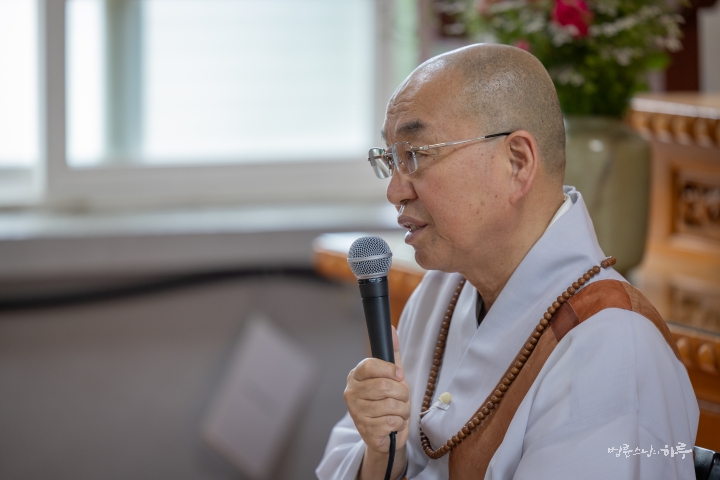
“If you have the perspective that ‘I can quit this at any time, and if I have a goal, I just need to put in as much effort as necessary,’ you will be less stressed. Stress arises when you become fixated on the idea that you must do certain things. You feel stressed not because things don’t turn out as you want but because of your attachment. That’s why the Buddha said, ‘Let go of attachment.’
“Of course, I, too, become attached sometimes and thus feel stressed. However, in those moments, I recognize that the stress comes from my own attachment, and my stress is relieved right away. This way, I can gradually move forward.”
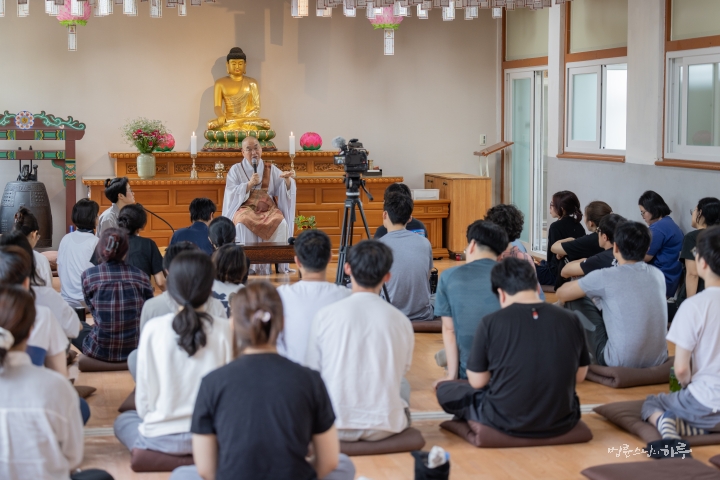
The young people wanted to ask more questions but it was time to do some communal work. It was decided to continue the conversation in the evening, before concluding the session.
The members of Jungto Society’s Youth Division were supposed to be with the Vietnamese youths up to this point before returning home. They all gathered in the yard and took a photo.
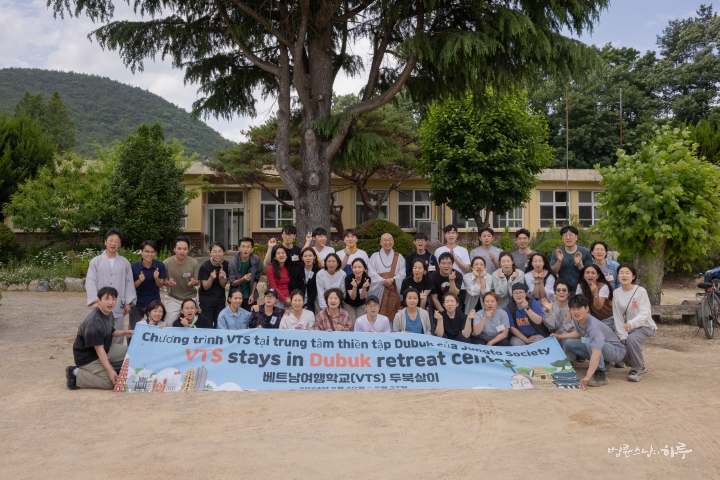
“We love peace in Korea and Vietnam!”
Sunim changed into work clothes and headed toward the greenhouse. The Vietnamese youths also quickly changed into work clothes and arrived at the greenhouse.
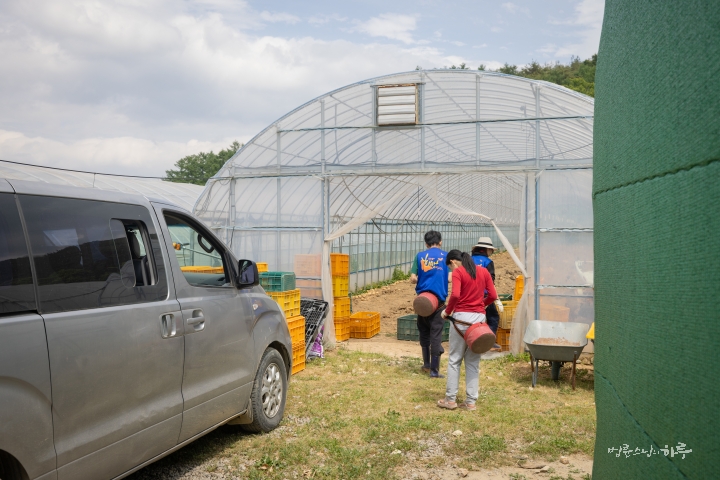
The potato harvest had been scheduled for today. By planting potatoes early inside the greenhouse, it was possible to harvest them a month earlier than regular potatoes. After reciting Words to Remember together three times, we received instructions from the farming team leader and began our work.
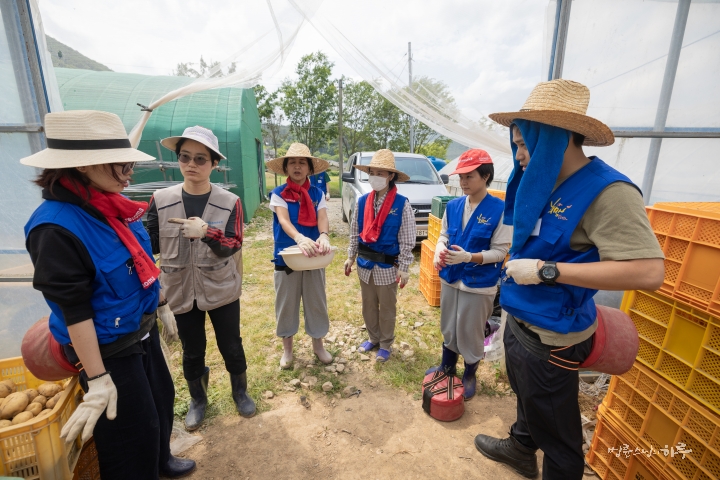
“Everything has its place.”
Yesterday, the potato stems were removed and four out of the seven furrows were turned over with a plow. Wherever the plow had passed, potatoes were exposed above the ground. The size of the potatoes was much larger and plumper than last year.
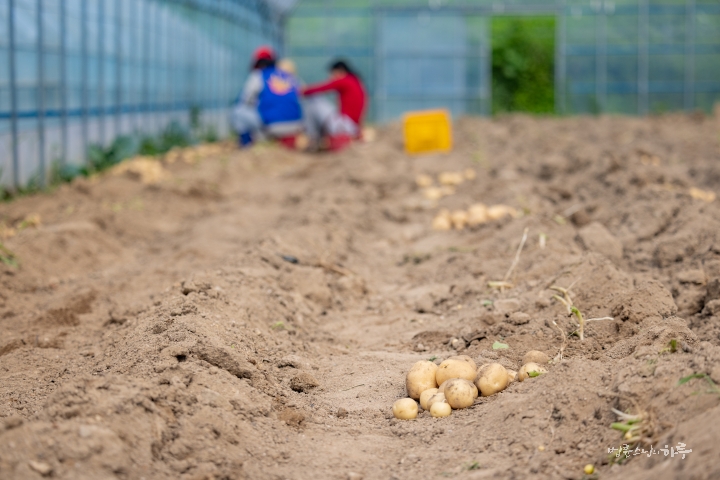
The potatoes were sorted into four categories based on size and placed into boxes: those larger than an egg, those the size of an egg, those smaller than an egg, and those very small. Potatoes that were pierced or damaged while digging were also separated.
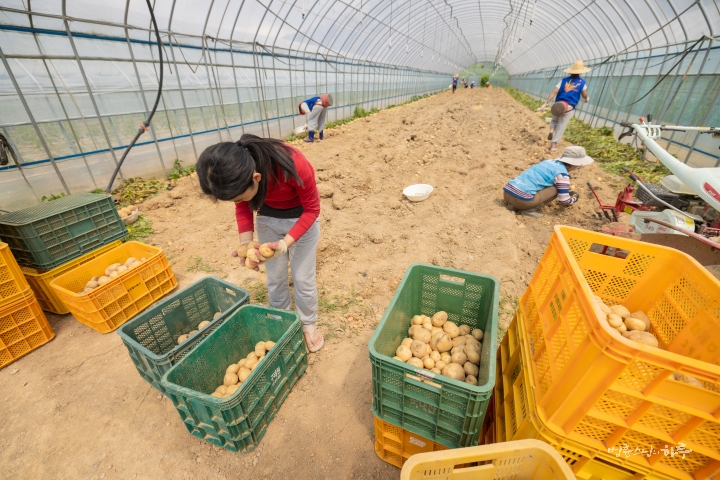
Sunim began digging potatoes along the edge of the greenhouse.
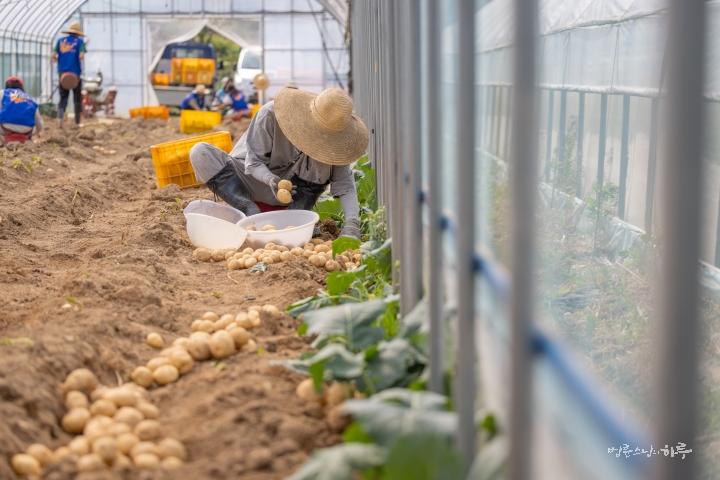
Along the edge, there were many weeds, so Sunim picked up potatoes one by one with his hands while pulling out the weeds. By scraping beneath the furrow with a hoe, causing it to collapse, the potatoes came tumbling out.
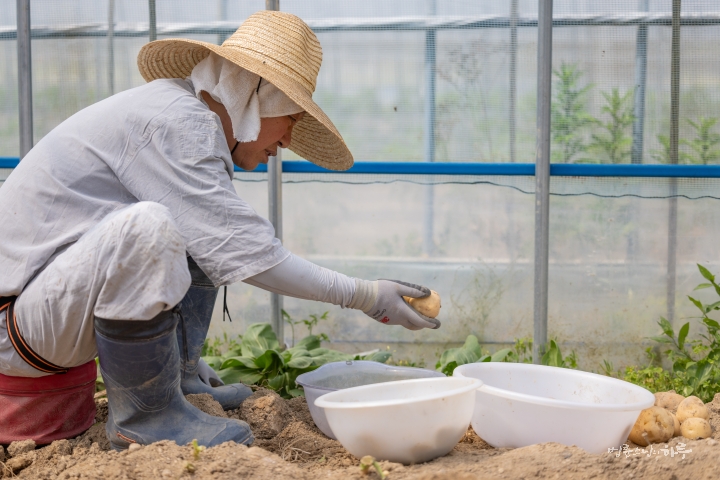
“Is this larger than an egg?”
“Yes, I think so.”
A trainee brought several containers for Sunim to sort potatoes according to size.
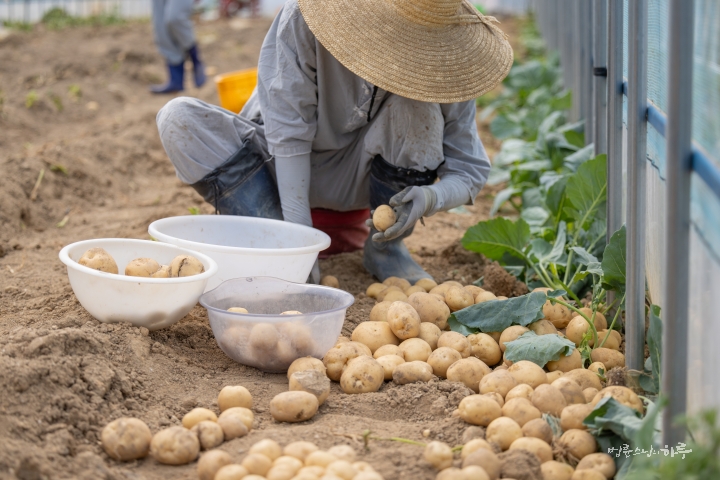
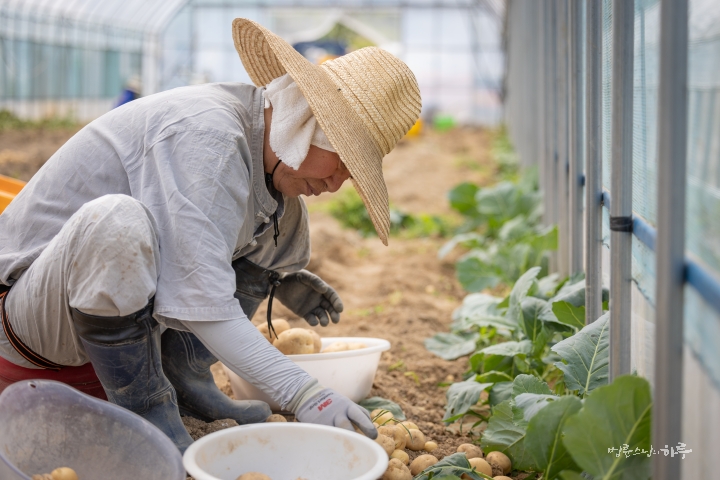
The Vietnamese youths also sat in rows in each furrow, digging potatoes from the ground. The potatoes were larger and more plentiful than last year, emerging as soon as the ground was dug.
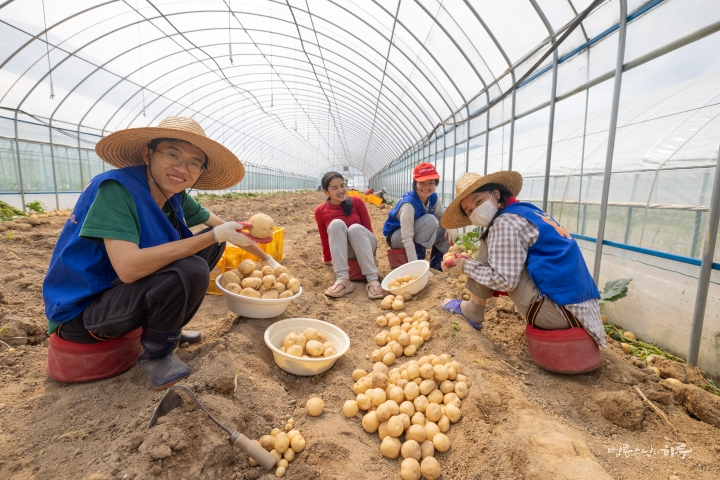
While everyone was busy sorting the potatoes, Bong, the youngest member of the VCIL, discovered a particularly large potato.
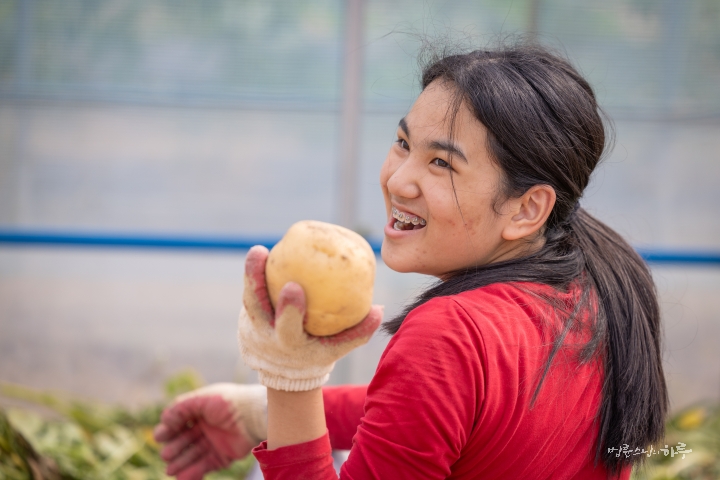
“I think this potato is the biggest potato harvested today. It’s very big.”
There were so many potatoes that everyone focused only on harvesting them. Although there were still many potatoes left to harvest, it was time to finish the communal labor.
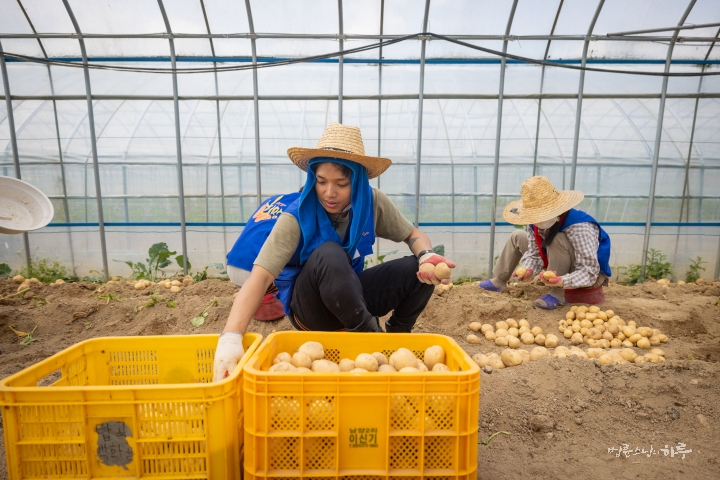
“It’s time to finish our work for dinner. Let’s wrap it up.”
Sunim said, smiling as he was leaving the greenhouse.
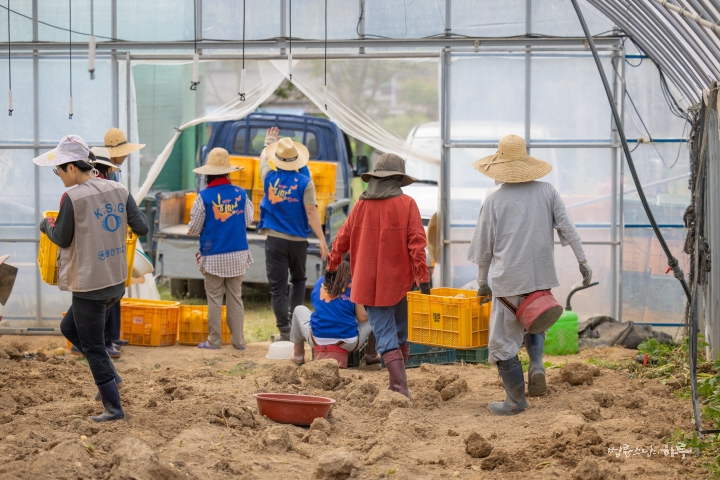
“The young Vietnamese who came last year kept singing; why don’t you sing today?”
“We focused only on harvesting potatoes today. Should we sing now?” (laughter)
A young man from Ladakh sang a song belatedly.
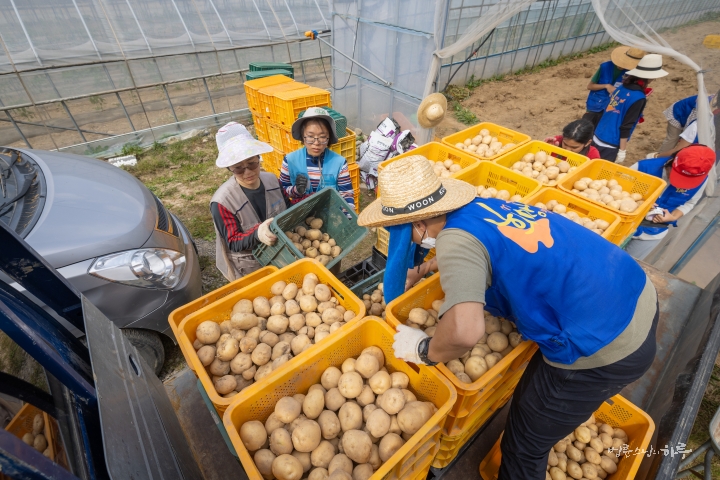
After loading the boxes of potatoes onto a truck, we recited Words to Remember three times before concluding the communal work.
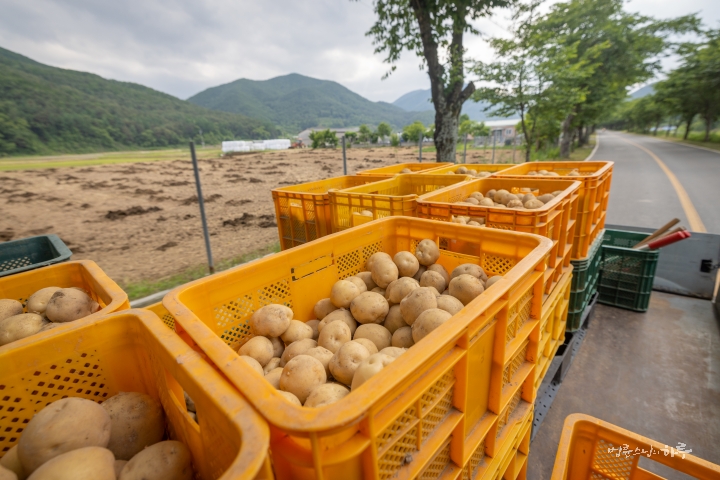
We returned to the retreat center for dinner.
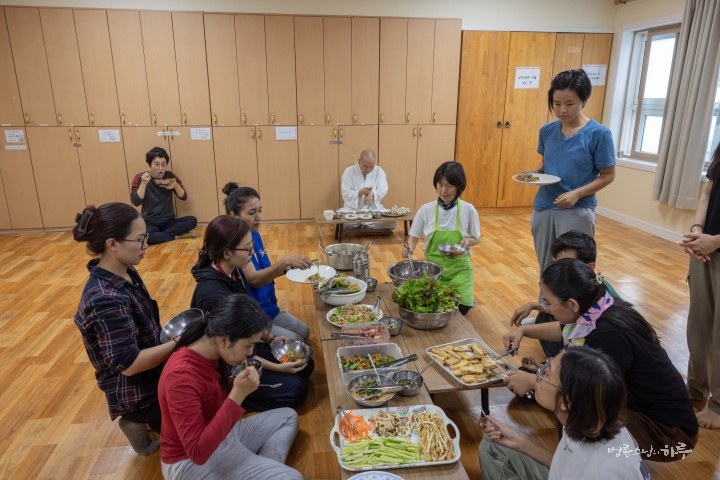
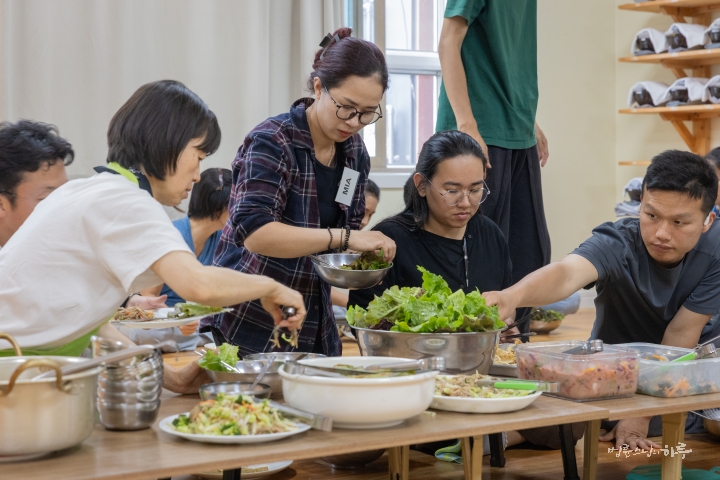
The Vietnamese youths had prepared traditional Vietnamese cuisine. Sunim also enjoyed the meal and expressed gratitude for the food.
“Thank you. I enjoyed the meal.”
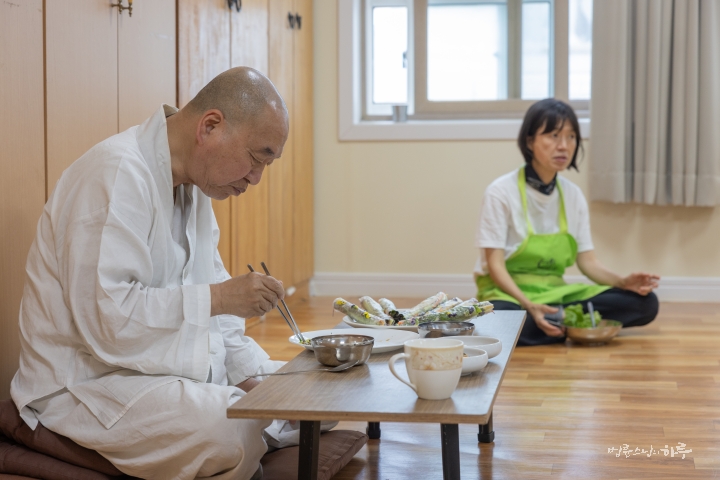
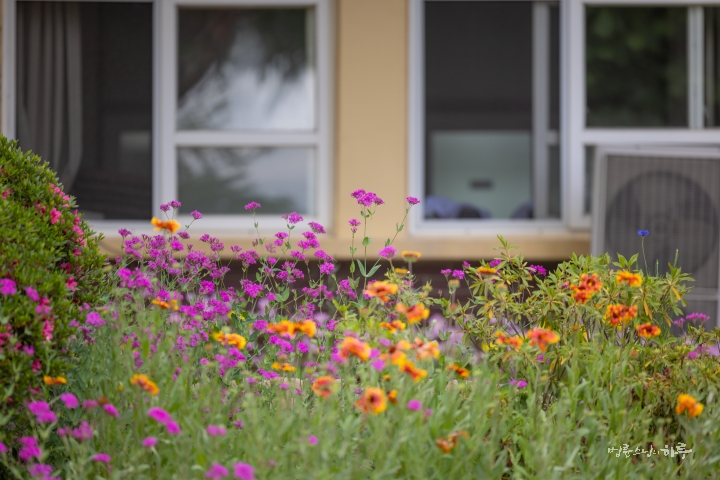
After dinner, the conversation with Sunim resumed at 5 p.m. Anyone could raise their hand and ask Sunim a question.
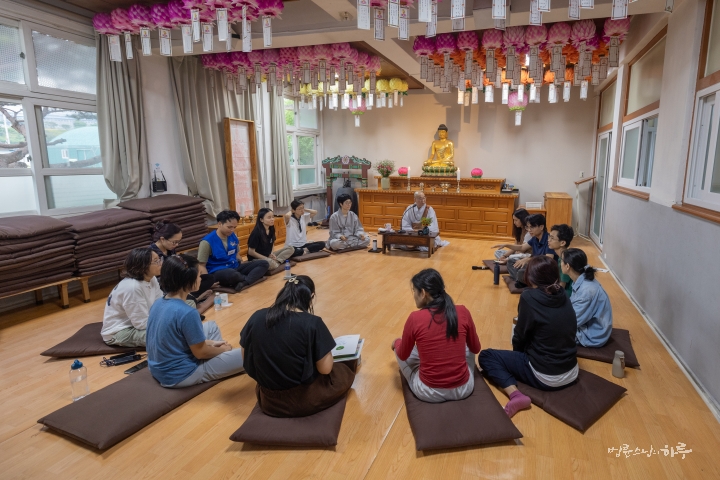
Various questions continued for two hours.
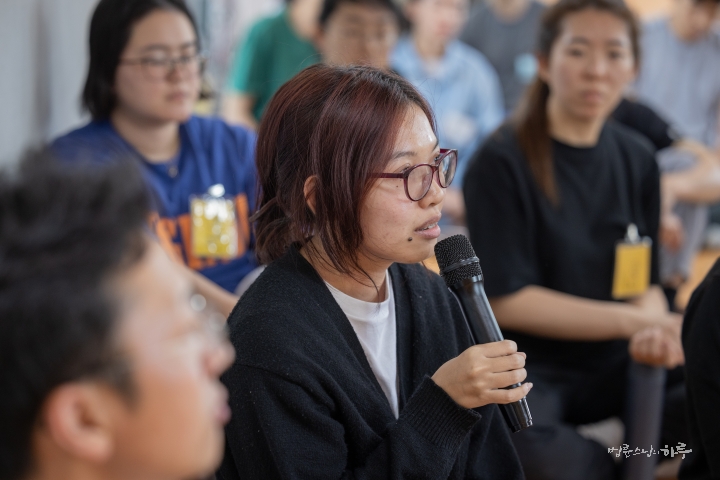
- When I am very angry, how should I control my anger?
- What is the meaning of praying toward the altar of the deceased after the Yebul ceremony?
- It seems like most members of Jungto Society are Koreans. Why are there so few foreign members?
- What do you consider to be the biggest mistake you’ve made in your life so far?
- As the owner of a children’s book publishing company, I often feel lonely. How can I control my mind?
- How should we view cults or fringe religions?
- You mentioned sustainable development in Bhutan, but what does sustainability mean?
Lastly, Thao, expressed concern about what would happen to Jungto Society after Sunim’s passing.
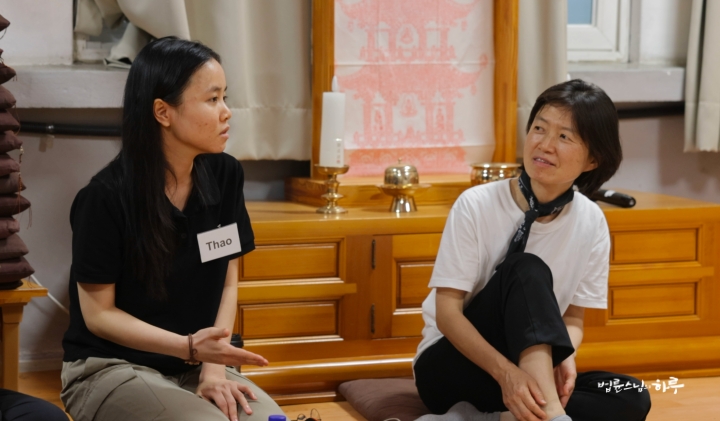
What will happen to Jungto Society when you are gone?
“Yesterday, while talking with the young members of Jungto Society, I was greatly inspired. They seemed to have been greatly influenced by you. I couldn’t help but think that you serve as both the motivation for them to join Jungto Society and the driving force for their continued work. Therefore, I became concerned about what would happen to Jungto Society when you are gone. I wonder if you have any thoughts or plans regarding this matter.”
“Since I am the founder of Jungto Society, it’s inevitable that my influence will be the greatest while I’m alive. Of course, if people join Jungto Society solely because of me and it is operated solely due to my influence, then its dissolution would be imminent upon my passing. However, Jungto Society has well-established systems. There is a group of Dharma teachers whose main function is to guide the members according to the Buddhadharma. Additionally, administration is conducted by representatives at the division, chapter, and group levels. Decision-making is also very democratic.
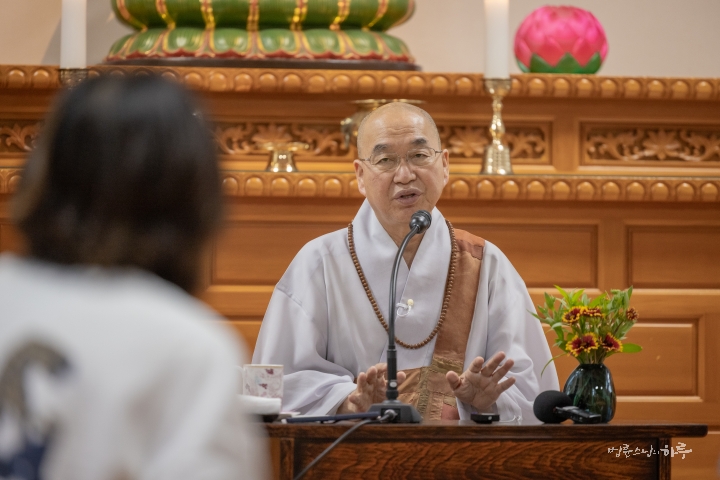
“The key programs of Jungto Society are Jungto Dharma School and Awakening Retreat. Jungto Dharma School operates by having students watch my video lectures and share their thoughts and feelings about them with their group facilitated by volunteers, known as facilitators and co-facilitators, rather than having a direct relationship with me. Therefore, even while I am alive, I’m not involved in the operation of Jungto Dharma School at all. Additionally, the Awakening Retreat is facilitated by other Dharma teachers, not by me. We continue to build systems where operations can proceed even without my presence. Thus, for the internal operation of Jungto Society, my absence won’t be a significant issue.
“If there are problems, they might occur in two areas related to the expansion of our work. The first concerns the influence on Korean people, which I don’t think can be immediately transferred to someone else just because they become the leader of Jungto Society. The second involves influence on people worldwide, which also cannot be replaced quickly. So if I pass away, there might be a temporary stagnation in matters related to expansion. However, if the Buddha’s teachings are truly valid, a new system that allows our continued expansion without relying on me will emerge even after my passing. Of course, it may take some time.
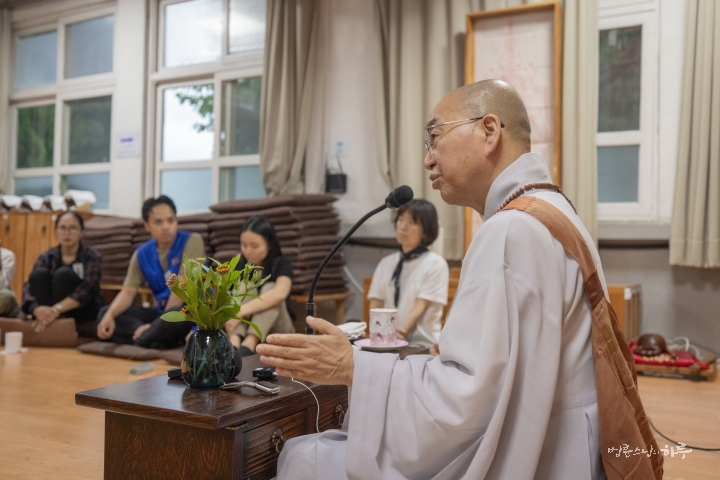
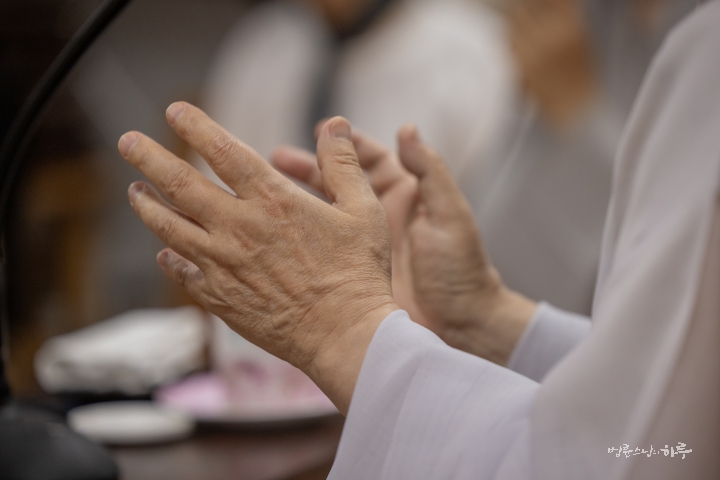
“The key aspect is ‘How much do people need this teaching?’ Whether it’s Pomnyun Sunim who delivers this teaching is secondary. From the outside, people might think that Jungto Society will collapse immediately without me. However, internally, we have many more safety measures in place than what is perceived from the outside.
“However, I believe that pioneering work will experience a significant period of stagnation. This is because I’m mostly involved in pioneering work, while Jungto Society’s leadership is engaged in the management and expansion of established projects. Farming at Dubuk Jungto Retreat Center has long been discussed as something that ‘should be done,’ but it was difficult to initiate. However, when I came to live here during the COVID-19 pandemic, it was finally possible to implement it. In the beginning, I naturally took the lead, but now systems have been established and everyone is taking charge of their respective tasks. We have established systems to the extent that my presence is no longer necessary. The sustainable development project underway in Bhutan is the same.
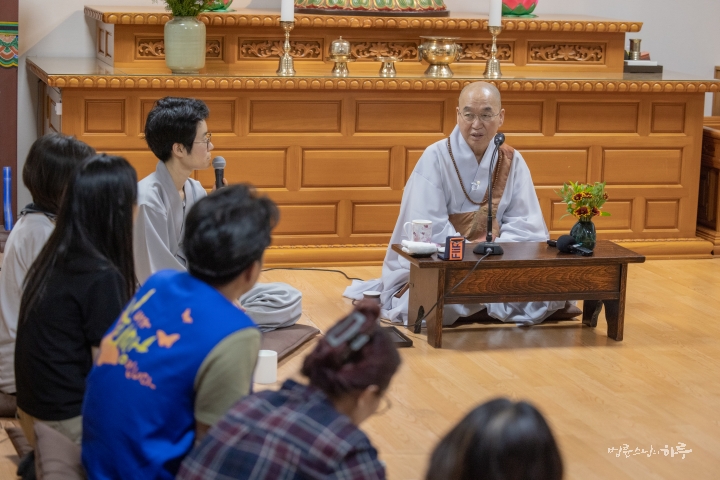
“Since I’ve been pioneering most of Jungto Society’s projects, I tend to have more ideas and hold some decision-making power. This means that when I lead a project, it tends to progress faster. However, other members go through sufficient discussion processes through meetings to make decisions, which offers stability. Yet when it comes to experimental projects, progress can be slower. So, like you, being in a situation where the scale is still small and your ventures started only recently isn’t necessarily disadvantageous. When the scale is small, decisions made through meetings are executed quickly, and even if there are failures, the consequences are not severe.
“As Jungto Society is gradually expanding, we have to focus more on operating safely because if we fail in any project, the damage can be significant. Therefore, we tend to invest less in pioneering or experimenting. So don’t just think that having a small-scale organization or little experience is disadvantageous. Due to the small scale of your organization and your limited experience, you can engage in more experiments and challenges. Also, decision-making and evaluation can be done more quickly compared with larger organizations, allowing you to quickly tackle new projects. When your organization is small, you can gain a lot of experience in a short period. Therefore, there is an advantage in becoming less afraid of failure. Additionally, the bond among members becomes much stronger.
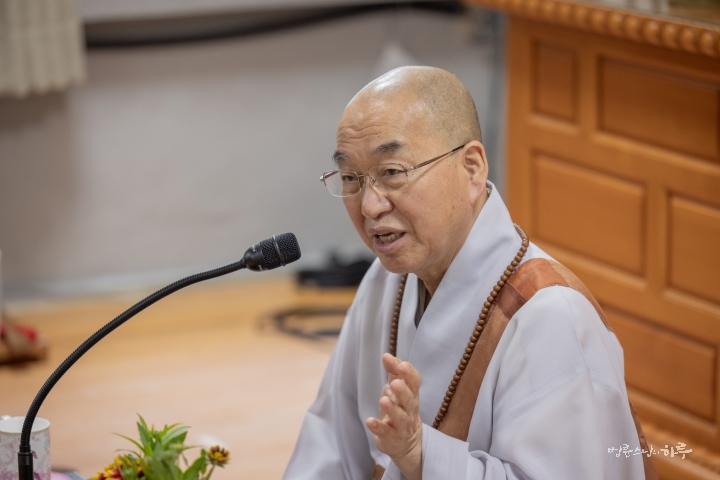
“The initial members of Jungto Society all started with me, so we’ve built up a strong bond among us while eating and working together. However, now that the scale of Jungto Society is gradually increasing, it’s inevitable that the recently joined members may not know each other although they are all members of Jungto Society, leading to less cohesion. Trust builds up when people share the same experiences, which leads to action. Simply admiring me does not necessarily translate into action. Therefore, for larger organizations, it’s important to engage new members in various small-scale activities to accumulate experiences together. So rather than envying the good things about other organizations, you need to study how to utilize your strengths. Then, even small-scale organizations can accomplish great things.”
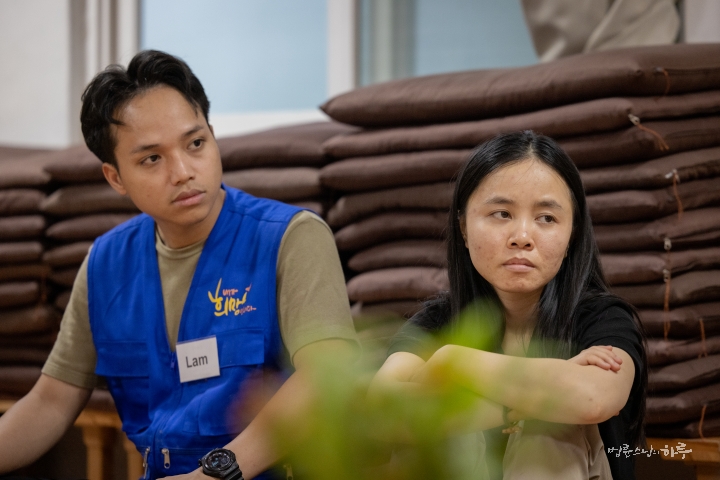
The young people gathered wanted to ask more questions, but it was time for the evening Yebul ceremony. It was decided to continue the conversation the following morning.
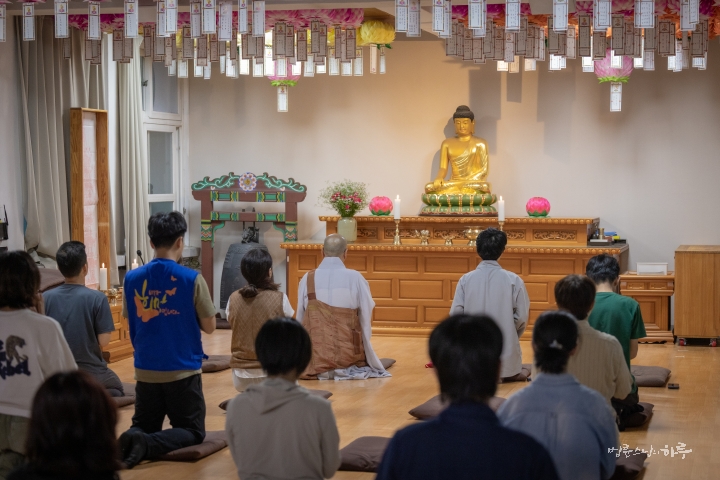
At 7 p.m., the evening Yebul ceremony began. Afterward, the Vietnamese youths watched a video showcasing Sunim’’s recent trip to Washington, D.C., where he met with government officials, members of the legislative branch, and thinktank representatives to advocate for peace on the Korean Peninsula.
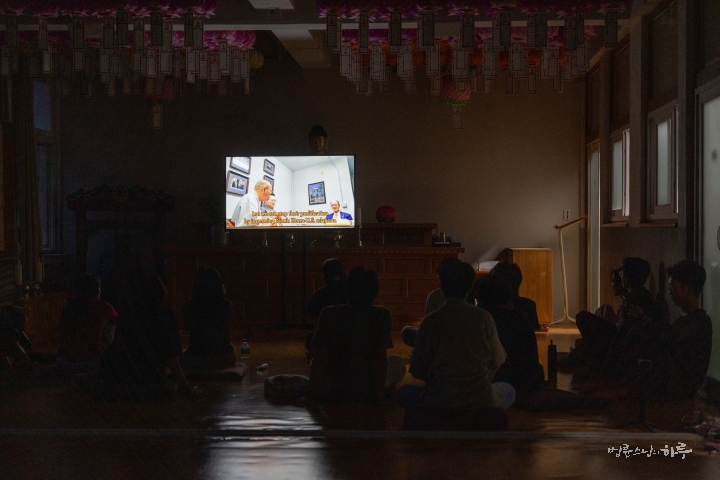
After watching the video, the Vietnamese youths shared their thoughts and feelings about their stay in Korea. As tomorrow is the last day of their visit, they took the time to reflect on the past week and share their thoughts and feelings with everyone.
At sunset, Sunim headed toward the field where the wheat had been planted. He checked to see if the wheat had fully ripened and finished his day’s work.
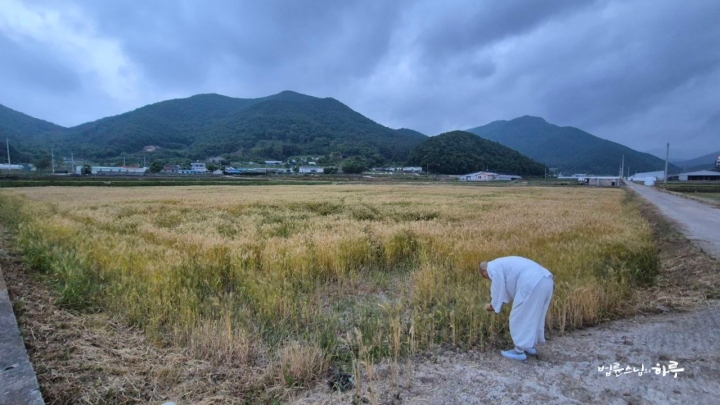
Tomorrow morning, Sunim will have a final conversation with the Vietnamese youths, then bid farewell to them as they leave Dubuk Jungto Retreat Center. In the afternoon, Sunim will move to Daejeon for the “Happy Conversations, Dharma Q&A with Ven. Pomnyun Sunim” at the Seo-gu Office Auditorium.
© 2024 Jungto Society - All Rights Reserved


